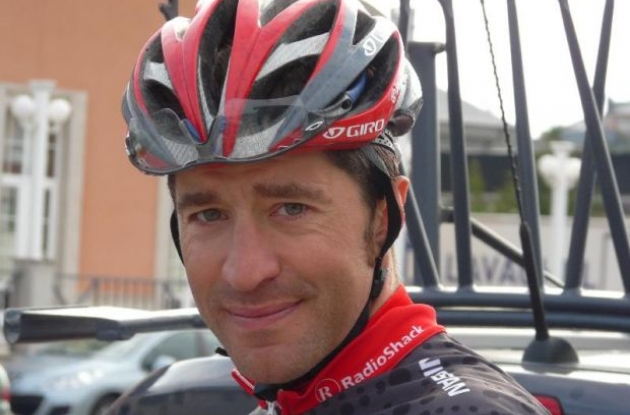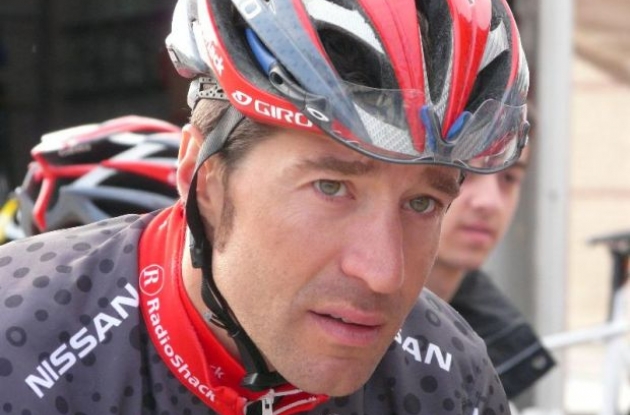Team RadioShack’s Chechu Rubiera Shares his Nutrition Secrets
As one of the more experienced stars of Team RadioShack, Jose Luis "Chechu" Rubiera has seen many changes in the world of professional cycling, not least when it comes to nutrition. In this exclusive interview, he tells Simon Burch how refuelling once meant munching on fruit - and why he has to dodge flying bars at feed stations.
If you are trying to find out which pro riders don't like the products they are supplied with by their sponsors, then you'll soon find out the answer at the feed stations, reckons Team RadioShack's experienced Spanish star Jose Luis "Chechu" Rubiera.
"Riders who don't like the bars will just take them out of their food bags and throw them away," 37-year-old Chechu says, "so there are often bars flying around during races.
"I have had times in the past when I didn't like the products we were given, because sometimes they don't taste so good or they are too hard to eat during the race."
"That's bad. If you are suffering and having a bad moment, if your food tastes good, at least it is something to turn to. If it tastes bad, you don't look out for the moment to eat and you will forget. If you don't eat at the right time, you'll be empty."
This is perhaps one downside of the food revolution within professional cycling which has seen the traditional refuelling products of yesteryear replaced by specially designed bars, gels and drinks.
"This is my 16th year, and when I started we used to have pieces of cake or apples and bananas during the races," says Chechu, who won his first race, stage 19 of the Giro D'Italia in 1997.
"We do still have cake sometimes, but I haven't had a piece of apple for maybe eight years now. Many of the guys eat bananas because of the potassium, but because you have to go back to the car, it's not a good idea in races, because it costs you time and effort to get one, unpeel it and eat it.
"It is much easier with bars and gels. The mechanics can just hand them to you already opened and they are quick to eat. This makes them more efficient, plus they contain many more calories."
This season, Chechu and his fellow Team RadioShack riders are using products from ZipVit Sport, which is supplying them with energy gels, bars and drinks, as well as recovery products, vitamins and minerals.
There is nothing within them that does not play an active role: as befits products designed to serve the modern professional, they are specially formulated, based on the latest nutritional scientific knowledge, to ensure that they contain the correct ingredients to rapidly deliver a burst of energy or, in the recovery products, what's needed to promote muscle repair and boost the immune system.
They are as far from a piece of cake or an apple as you are ever likely to get, while the emphasis on post-exercise recovery is a whole new arena in itself.
"In the early days, we didn't know anything about that kind of stuff," says Chechu, who uses gels while racing but sticks to bars while training and supplements his diet with amino acids after exercise.
"We have come to learn that recovery is very important during stage races, and if I have done some hard training I will take recovery products afterwards too."
Chechu's ability to recover properly will come to the fore in September when he takes part in the highlight of his 2010 season - the Vuelta a Espana.
"I won't be in the Tour de France team, so that it is the one I am most looking forward to," he says. "I am looking forward to riding up in the north of Spain, in the Basque Country, Galicia and in two stages in Asturias, which is my home region."
It is when he is back in Asturias, - or in his home town of Muñó-Siero to be precise, that Chechu indulged himself in his favourite comfort food - fabada, a local stew containing large white beans, shoulder of pork or bacon, black pudding and spicy chorizo sausage.
"It is heavy, strong food," says Chechu, "and typical of my region. People used to eat it before working hard and many times when I go home to my parents' home I will have some.
"But only once in a while, once a month maybe. I do believe that even during a season you need some food that you crave. It is good for the head, because if you are always thinking about food and you can't have it, that's worse than trying a little bit of it."
In fact, Chechu advises that athletes should never be shy of eating - as long as it is the right food - when they've got a training regime to fuel.
"People shouldn't get too stressed about food," says Chechu. "Even if they're exercising to lose weight it is important to have good meals every day, and they need to eat every kind of food such as meat, fish, pasta, rice and fruit.
"Just stopping eating while carrying on training won't work. Instead, they should always eat well, but should train harder and longer as well."









